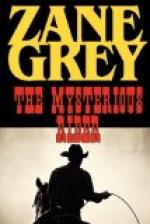“If I’m his wife,” she went on, “I’ll have to be with him—I’ll have to give up this little room—I’ll never be free—alone—happy, any more.”
That was the first detail she enumerated. It was also the last. Realization came with a sickening little shudder. And that moment gave birth to the nucleus of an unconscious revolt.
The coyotes were howling. Wild, sharp, sweet notes! They soothed her troubled, aching head, lulled her toward sleep, reminded her of the gold-and-purple sunset, and the slopes of sage, the lonely heights, and the beauty that would never change. On the morrow, she drowsily thought, she would persuade Wilson not to kill all the coyotes; to leave a few, because she loved them.
* * * * *
Bill Belllounds had settled in Middle Park in 1860. It was wild country, a home of the Ute Indians, and a natural paradise for elk, deer, antelope, buffalo. The mountain ranges harbored bear. These ranges sheltered the rolling valley land which some explorer had named Middle Park in earlier days.
Much of this inclosed table-land was prairie, where long grass and wild flowers grew luxuriantly. Belllounds was a cattleman, and he saw the possibilities there. To which end he sought the friendship of Piah, chief of the Utes. This noble red man was well disposed toward the white settlers, and his tribe, during those troublous times, kept peace with these invaders of their mountain home.
In 1868 Belllounds was instrumental in persuading the Utes to relinquish Middle Park. The slopes of the hills were heavily timbered; gold and silver had been found in the mountains. It was a country that attracted prospectors, cattlemen, lumbermen. The summer season was not long enough to grow grain, and the nights too frosty for corn; otherwise Middle Park would have increased rapidly in population.
In the years that succeeded the departure of the Utes Bill Belllounds developed several cattle-ranches and acquired others. White Slides Ranch lay some twenty-odd miles from Middle Park, being a winding arm of the main valley land. Its development was a matter of later years, and Belllounds lived there because the country was wilder. The rancher, as he advanced in years, seemed to want to keep the loneliness that had been his in earlier days. At the time of the return of his son to White Slides Belllounds was rich in cattle and land, but he avowed frankly that he had not saved any money, and probably never would. His hand was always open to every man and he never remembered an obligation. He trusted every one. A proud boast of his was that neither white man nor red man had ever betrayed his trust. His cowboys took advantage of him, his neighbors imposed upon him, but none were there who did not make good their debts of service or stock. Belllounds was one of the great pioneers of the frontier days to whom the West owed its settlement; and he was finer than most, because he proved that the Indians, if not robbed or driven, would respond to friendliness.




